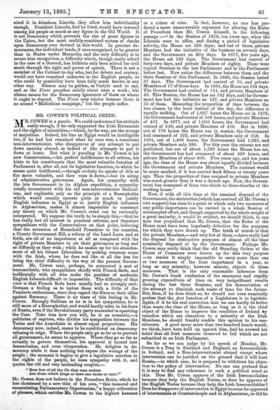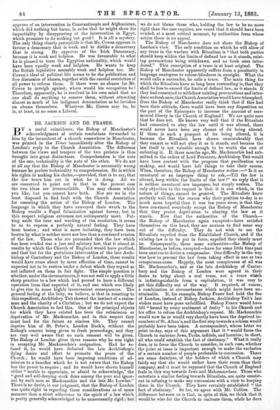MR. COWEN'S POLITICAL CREED.
MR. COWEN is a puzzle. We could understand his attitude easily enough, if he only supported the Irish Extremists and the rights of minorities,—which, by the way, are the wrongs of majorities. Indeed, his line on Egypt would be intelligible too, if he had but remained what he once was, a consistent non-interventionist, who disapproves of any attempt to put down anarchy abroad, as indeed of like attempts to put it down at home. But what is puzzling in Mr. Cowen is his new Conservatism,—his perfect indifference to all reform, his hints to his constituents that the most valuable function of Parliament is, after all, not its legislative function, to which he seems quite indifferent,—though verbally he speaks of this as the more valuable, and then runs it down,—but its airing of administrative grievances. Again, his sympathy with the late Government in its Afghan expedition, a sympathy totally inconsistent with his old non-interventionist Radical- ism, and explicable only on the principle of a Russophobia which would usually operate quite as much to justify English influence in Egypt as to justify English influence in Afghanistan, makes it almost impossible to construct any theory on which Mr. Cowen's creed can be rationally interpreted. We suppose the truth to be simply this,—that he has really lost all interest in practical reforms, and therefore sympathises with the Conservatives on that point, believing that the extension of Household Franchise to the counties, a County Government Bill, a reform of the Land Laws, and so forth, are all of no importance at all as compared with the right of private Members to air their grievances as long and as diffusely as they wish ; while he makes up for his abandon- ment of all his former Liberalism by making common cause with the Irish, whom he does not like at all the less for being the chief difficulty in the way of the present Govern- ment. Mr. Cowen may, perhaps, be accounted 'a. sort of irreconcilable, who sympathises chiefly with French Reds, and incfdentally with all who make the position of moderate English Liberals difficult or impossible. The difficulty of that view is that French Reds have usually had so strongly anti- German a feeling as to imbue them with a little of the Panslavic enthusiasm, since they regard the Slays as their allies against Germany. There is no trace of this feeling in Mr. Cowen. Strongly Galilean as he is in his sympathies, he is still more of a Russophobist, and would hardly relax in his fears of Russia, even if the Revolutionary party succeeded in upsetting the Czar. Take him how you will, he is an eccentric,—a politician of caprices, who divides his sympathies between the Tories and the Anarchists in almost equal proportions. His democracy now, indeed, seems to be conditional on democracy refusing to reign. Where the people only go so far as to prevent all government, he seems to approve. Where they go so far as actually to govern themselves, his approval is turned into denunciation, and even vituperation. He delights in de- mocracy while it does nothing but expose the wrongs of the people ; the moment it begins to give a legislative sanction to the rights of the people, he loses sympathy with it, and quotes the old and very misleading couplet,- " How few of all the ills that men endure
Are those which kings or laws can cause or cure !"
Mr. Cowen does not believe in the Procedure Rules, which he has christened by a new title of his own, "this immoral and emasculating Parliamentary Opportunism," a happy collocation of phrases, which entitles Mr. Cowen to the highest honours
as a coiner of cries. In fact, however, no one has pro- duced a more unanswerable argument for altering the Rules of Procedure than Mr. Cowen himself, in the following passage :—" In the Session of 1872, ten years ago, when the Liberals were in office, and during a period of legislative activity, the House sat 120 days ; and out of these, private Members had the initiative of the business on seventy days, and the Government on fifty days. In 1877, five years ago, the House sat 122 days. The Government had control of forty-two days, and private Members of eighty. These were typical Sessions in the last Parliament and in the Parliament before last. Now notice the difference between them and the three Sessions of this Parliament. In 1880, the Session lasted 87 days. The Government had control of 70, and private Members of 17 of those days. In 1881, the House sat 184 days. The Government had control of 144, and private Members of 40. This Session, the House has sat 162 days, and the Govern- ment has had the initiative on 127, and private Members on 35 of them. Measuring the proportion of time between the two classes by the hour instead of the day, the difference is equally striking. Out of 1,027 hours the House sat in 1872, the Government had control of 560 hours, and private Members of 467. In 1877, out of 1,039 hours, the Government had control of 540, and private Members of 499. But in 1880, out of 778 hours the House was in session, the Government had command of 522, and private Members only of 258. In 1881, out of 1,409 hours, the Government had 1,029, and private Members only 380. For this year the returns are not published, but out of about 1,320 hours the House has sat, the Government has had command of about 920 hours, and private Members of about 400. Five years ago, and ten years ago, the time of the House was about equally divided between the Government and private Members. The contrast would be more marked, if it was carried back fifteen or twenty years ago. Then the proportion of time assigned to private Members was much greater than it was a decade ago. Now, the Govern- ment has command of from two-thirds to three-fourths of the working hours."
Now, if with all this time at the nominal disposal of the Government, the obstruction (which has received all Mr. Cowen's own support) has risen to a point at which only two measures of any public importance can be carried in a whole Session of unexampled effort, and though supported by the whole weight of a great majority, it would be evident, we should think, to any man less prejudiced than Mr. Cowen, that the Rules of the House must have been hopelessly defective for the purposes for which they were drawn up. The truth of course is that the private Members,—and very few of them,—have really had the disposal for obstructive purposes of almost all the time nominally disposed of by the Government. Perhaps Mr. Cowen may really think that the old Standing Orders of the House of Commons were drawn up for • this very purpose —to render it simply impossible to carry more than one or two measures of the least importance in a year, so long as any minority, however minute, objects to those measures. That is the only reasonable inference from Mr. Cowen's frank confession of the enormous and rapidly growing expenditure of time on very insignificant results during the last three. Sessions, and his denunciation of the attempt to diminish such waste of time for the future. But, then, if he does think so, he should not even nominally profess that the first function of a Legislature is to legislate. Again, if it be his real conviction that we can hardly do better than waste the time of the House, so long as it is the chief object of the House to improve the condition of Ireland by remedies which are obnoxious to a minority of the Irish Members, he should frankly confide this opinion to his con- stituents. A good many more than two hundred hands would, we think, have been held up against him, had he avowed his belief that all Irish measures deserved to fail which are not submitted to an Irish Parliament.
So far as we can judge by his speech of Monday, Mr. Cowen is a Tory in Scotland and England, an Irreconcilable in Ireland, and a Non-interventionist abroad except where intervention can be justified on the ground that it will hurt Russia,—in which case, he is prepared to withdraw his objec- tion to the policy of intervention. No one can pretend that it is easy to find any coherence in such a political creed as this. Does Mr. Cowen approve of the Irish Irreconcilables because they help the English Tories, or does he approve of the English Tories because they help the Irish Irreconcilables f Does he disapprove of intervention in Egypt because he approved of intervention at Constantinople and in Afghanistan, or did he approve of an intervention in Constantinople and Afghanistan, which did nothing but harm, in order that he might show his impartiality by disapproving of the intervention in Egypt, which promises to do nothing but good It is all a mystery. The only thing clearly perceptible is that Mr. Cowen appears to favour a democracy that is weak, and to dislike a democracy that is strong. He approves of the Irish Democracy, because it is weak and helpless. He was favourable to what he is pleased to term the Egyptian nationality, which would have been equally weak and helpless. He wants to keep the British legislative assembly weak and helpless too. Mr. Cowen's ideal of political life seems to be the publication and free discussion of abuses, together with the careful restriction of all power to reform them. If there were no abuses for Mr. Cowen to inveigh against, where would his occupation be ? Therefore, apparently, he is resolved in his own mind that no one shall do anything to remove them, without attracting almost as much of his indignant denunciation as he lavishes on abuses themselves. Whatever Mr. Cowen may be, he is, at least, in no sense a Liberal.



































 Previous page
Previous page